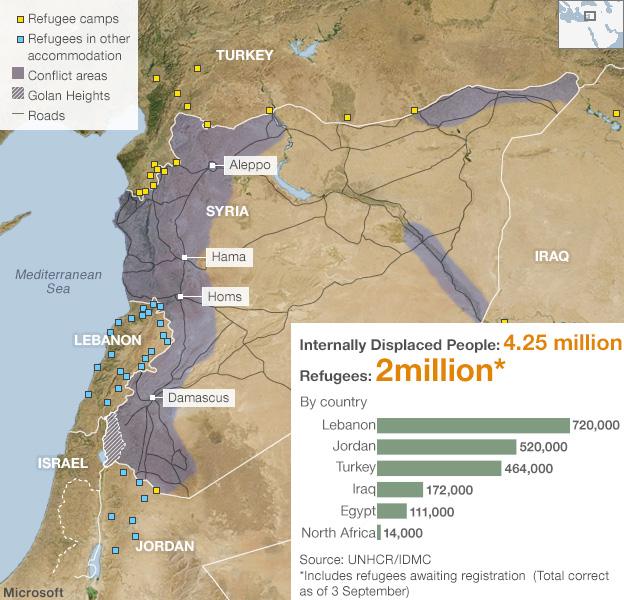Syria crisis: US senators' draft backs limited action
- Published
John Kerry: "Assad regime unleashed an outrageous chemical attack on its own citizens"
US senators in a key committee have agreed on a draft resolution backing the use of US military force in Syria.
The measure to be voted on next week sets a time limit of 60 days on any operation. The draft document also bans the use of any ground forces in Syria.
Secretary of State John Kerry said the US had to act after the Assad regime's "undeniable" chemical weapons attack.
The Republican Speaker of the House of Representatives, John Boehner, endorsed Mr Obama's call for military action.
According to a copy of the draft resolution obtained by AFP news agency, the senators wish to restrict the operation to a "limited and tailored use of the United States Armed Forces against Syria".
The resolution states that "the president may extend" a 60-day operation "for a single period of 30 days" if he obtains further specific Congressional approval.
"The authority granted... does not authorise the use of the United States Armed Forces on the ground in Syria for the purpose of combat operations," the statement added.
The BBC's North America Editor Mark Mardell in Washington says it is by no means the definitive motion, but it is a strong indication of the way committee members are thinking.
No 'armchair isolationism'
The draft was released after Mr Kerry appeared before the Senate Foreign Relations Committee.
The secretary of state said there was evidence beyond any reasonable doubt that the forces of President Bashar al-Assad prepared for a chemical weapons attack near Damascus on 21 August.
Mr Kerry told the senators the President was not asking America to go to war. "He is asking only for the power to make clear, to make certain, that the United States means what we say."
Standing aside, he said, would allow other countries to pursue weapons of mass destruction.
"This is not the time for armchair isolationism," Mr Kerry added . "This is not the time to be spectators to slaughter.''
US Defence Secretary Chuck Hagel and the top US military officer, Gen Martin Dempsey, also appeared before the Senate panel.
Mr Hagel said that "the word of the United States must mean something", and echoed Mr Kerry when adding: "A refusal to act would undermine the credibility of America's other security commitments, including the president's commitment to prevent Iran from acquiring a nuclear weapon."
Earlier on Tuesday President Obama met key congressional leaders at the White House. He said a "limited" strike was needed to degrade Syrian government's capabilities in response to an alleged chemical weapons attack.
Mr Boehner said he supported Mr Obama's call for action, and that only the US had the capacity to stop President Assad. Mr Boehner urged his colleagues in Congress to follow suit.
Tough sell
Mr Obama also won the backing of Eric Cantor, the House of Representatives' majority leader.
But the BBC's Jane O'Brien, in Washington, says Mr Obama still faces a tough task winning the support of the American people.
The latest opinion poll shows public opposition to involvement in the Syrian conflict is growing, with six out of 10 Americans against missile strikes and lawmakers also divided.
Mr Obama is now travelling to Sweden, ahead of a G20 meeting in Russia later in the week that is sure to be dominated by Syria.
Barack Obama: "This is a limited, proportional step that will send a clear message"
France has strongly backed the US plan for military action.
President Francois Hollande said on Tuesday: "When a chemical massacre takes place, when the world is informed of it, when the evidence is delivered, when the guilty parties are known, then there must be an answer."
He called for Europe to unite on the issue, but said he would wait for the Congress vote.
If Congress did not support military action France "would not act alone", he said.
UK Prime Minister David Cameron had also backed Mr Obama, but Parliament rejected a resolution on military action.
At the US hearing, Mr Kerry said the possibility of such a defeat in Congress was "too dire" to contemplate.
'Overwhelming burden'
UN Secretary General Ban Ki-moon had earlier said that the organisation's charter permitted military action only in self defence or with the agreement of the Security Council.
Mr Ban said a US military response could create more turmoil, but that if chemical weapons had been used in Syria then the Security Council should unite and take action against what would be "an outrageous war crime".
The US has put the death toll from the attack on the outskirts of Damascus on 21 August at 1,429, including 426 children, though other countries and organisations have given lower figures.
The BBC's Quentin Sommerville meets Syrians sheltering in a slaughterhouse in Lebanon
The Syrian government denies any involvement and blames rebels for the attack.
In an interview with French newspaper Le Figaro on Monday, President Assad warned that foreign military action could ignite a wider regional conflict.
Earlier, the UN refugee agency said that more than two million Syrians were now registered as refugees, after the total went up by a million in the past six months.
As well as those who have left the country, a further 4.25 million have been displaced within Syria, the UNHCR says, meaning that more people from Syria are now forcibly displaced than from other country.
The UN says this is the worst refugee crisis for 20 years, with numbers not seen since the 1994 genocide in Rwanda.
